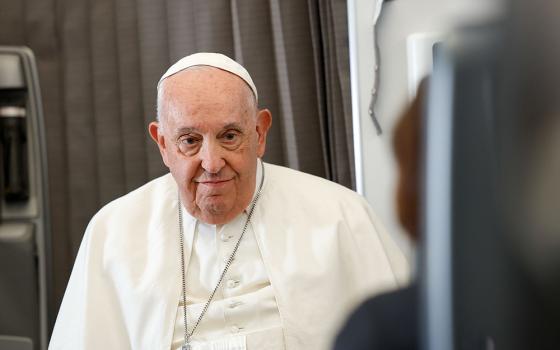
(Unsplash/Hello I'm Nik)
I participate twice a week in a ritual that, for me, is a sacrament — my 50-minute sessions of psychotherapy.
I'm there. My therapist is there. Also there is God and God's grace.
It used to go this way: Early afternoon on each Tuesday and Thursday, I'd get on the Chicago "L" to head to The Loop. I'd go to one of the many tall buildings downtown, ride the elevator up to the 19th floor and enter a small waiting room where, at the prescribed time, I'd be invited into my therapist's office.
Now, and until I'm vaccinated and feel safe in public again, we meet by phone.
Therapy isn't one of the seven official sacraments identified by the church as having been instituted by Jesus. Like any Catholic, I have gone through my share of those.
I was baptized and later confirmed. I've gone to confession, and, every week at my Catholic parish or some other Catholic place, I participate in the Eucharist. My wife, Cathy, and I were married at our parish although, during one long period in my life, I thought I'd end up taking holy orders. No anointing of the sick for me, not yet.
The U.S. Conference of Catholic Bishops explains that these seven are outward expressions of an invisible reality — the transmission of grace from God, a gift of love.
The bishops compare a sacrament to a father hugging his daughter. The hug is the outward expression. The invisible and much more important reality is that the hug conveys love to the child.
I've always had the idea — maybe this was something I picked up in the seminary — that a hug like that is a sacrament. It's not an official sacrament, but it is the same as a sacrament inasmuch as it's an outward action that indicates the giving of an invisible gift, the giving of God's grace and love.
We love and we do good with the help of God's grace. So, if I'm in the hospital and a friend from our weekly basketball games comes to visit, he's showing a kind of love to me, and he's doing it with the grace of God. The church calls visiting the sick a corporal work of mercy.
As far as I know, psychotherapy hasn't been classified by the church like a corporal work of mercy. But, then, I don't think hugging your kid has a special church category either.
I know a goodly number of people who go or have gone to a therapist, whether called a psychiatrist, a counselor or a social worker. My wife, Cathy, is a social worker therapist who's been seeing clients for 40 years. And that's the sort of therapist I've seen — for almost all of the 1990s and for the past four years since a traumatic event.
This isn't the place for me to trot out the sorts of issues I've wrestled with in therapy, but let me acknowledge that it's hard and painful work, and very rich, too.
And very holy.
Each of the seven sacraments involves a giving and a receiving. In the Eucharist, for instance, Jesus, through the priest, gives to me his body and blood, and I receive it, essentially saying "yes" to my faith and "yes" to living a Christian life to the best of my ability.
Advertisement
I'm not only receiving something, but giving something back as well — saying "yes."
The process of therapy also involves a giving and a receiving, and, like those sacraments, it goes in two directions.
My therapist gives me a space where I can look at the many facets of my life and actions and motivations, especially those that are difficult to face in normal conversation or even think about.
She doesn't sit in judgment and, in my experience, doesn't say much beyond asking an occasional question. What she gives me is her listening and her acceptance.
What I bring to the process is my stuff — i.e., the emotional and psychological experiences that have shaped me — and my willingness to look at the often harsh, bleak, embarrassing, constraining, joyous and pleasurable aspects of those experiences.
So my therapist is giving me a readiness to listen and really hear me, and I am receiving the opportunity from her to talk about this often-difficult stuff.
And, as with the Eucharist, I'm giving back a "yes" — a "yes" to do this very difficult labor and to push and search and delve into myself, session after session, to better understand who I am and why I act the way I do and to try to find ways in which I can change to make my life richer — and to understand that some parts of who I am have been formed by experiences and traumas in my past that cannot be changed.
This seems to me a sacred thing — to try to live a better life; to learn how to be more present, more alive, in every moment of life; and to accept the parts of life that I can't control. I'm saying "yes" to me and also to God.
I'm saying "yes" that I am not perfect, and "yes" that I can love myself despite those imperfections.
I'm, in a way, giving myself a hug — and so is God. To my mind, that's a sacrament, without question.
[Patrick T. Reardon is the author of nine books, most recently The Loop: The "L" Tracks That Shaped and Saved Chicago.]
Editor's note: We can send you an email every time Soul Seeing is published so you don't miss it. Sign-up here.







